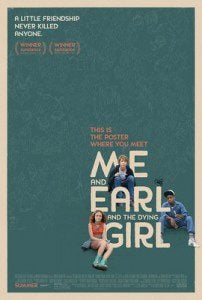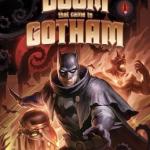Review of Me, Earl, and the Dying Girl, Directed by Alfonso Gomez-Rejon
If there’s a any sort of progression from A Walk to Remember to The Fault in our Stars, director Alfonso Gomez-Rejon’s Me, Earl, and the Dying Girl represents the next iteration in stories about a young woman who gets cancer. It’s probably the best film in the category to date, and it is the cancer movie that this generation deserves. Where author John Green’s piercing Fault in our Stars struck an emotional chord with disillusioned young readers last year as an existential tearjerker about a budding philosopher, Me, Earl, and the Dying Girl is filled with characters much more like us: detached, ambivalent and emotionally isolated.
Oh, and Gomez-Rejon wants you to know that it’s definitely not a tearjerker, because that’s an insulting term to give a film.
The “me” in the film’s title is Greg (Thomas Mann), a teenager who exists as an invisible sort-of-but-not-really member of the various high school “kingdoms” – nerds, jocks, Goths, and so on. The story is told from Greg’s perspective, and he occasionally interjects with deadpan narration. “Earl” (RJ Cyler) is the closest thing Greg has to a friend – a blunt, trash-talking black kid from the wrong side of the tracks who Greg refers to as a “colleague” because they make crappy parodies of classic foreign art films together. The “dying girl” is Rachel (Olivia Cooke), who is diagnosed with leukemia at the beginning of the film. Greg’s mom guilt trips him into hanging out with Rachel because she has cancer, and so begins the story.

It’s not hard to imagine where the plot should go from there: Greg and Rachel form an unlikely friendship and ultimately fall passionately in love before she falls tragically and heroically to cancer. But narrator Greg interjects repeatedly over the course of the movie that this is not the case. They don’t fall in love, he tells the audience, and she doesn’t die in the end.
The filmmaking antics of Greg and Earl lend the film a delightfully creative aesthetic – something like a modern, suburban Hugo, with a dash of Wes Anderson. The pair’s lunch-money parodies represent an ode to obscure masterpieces of foreign cinema, which have their own peculiar power over audiences even when the viewer (an adolescent Greg or Earl, for example) has almost no idea what’s going on. Put more specifically, it’s an ode to the origins of the creative filmmaker, the raw storyteller concerned less by style and form than the guttural need to express himself. Greg doesn’t know why he made 42 crappy parody films, he just does. He has nothing else to do, and so he lingers as a directionless artist, a void of regret and a mess of dying potential.
For a few months over which the film takes place, however, that void is filled by a dying girl. Something takes form in Greg’s heart. He takes the first tentative steps outside his own barriers of detachment, and everything changes.
To be clear, it takes a lot of awkwardness and dark humor to get to this point of personally transformation – and I mean a lot, which is what sustains the film’s energy and makes it worth watching. Emotionally, it walks a delicate line strung between heart and humor. Greg’s awkwardness and comical internal narration keeps the tears at bay, but in the end it still cares deeply for the stories of its characters. By skirting the romance we all inevitably expect, it lends dignity (rather than clichés) to the friendship between Greg and Rachel, showing us how the relationships that truly transform us don’t emerge from the fireworks of erotic passion. Instead, we see how the character growth that really counts for something only comes through a much more arduous road of honesty, sacrifice, and faithfulness that destroys our self-pity rather than merely escaping or suppressing it.
Indeed, in spite of its anti-mushiness, something quite beautiful emerges out of Me, Earl, and the Dying Girl, because in the end, it isn’t the dying girl who really needs life. It’s the boy who had never started to live.













